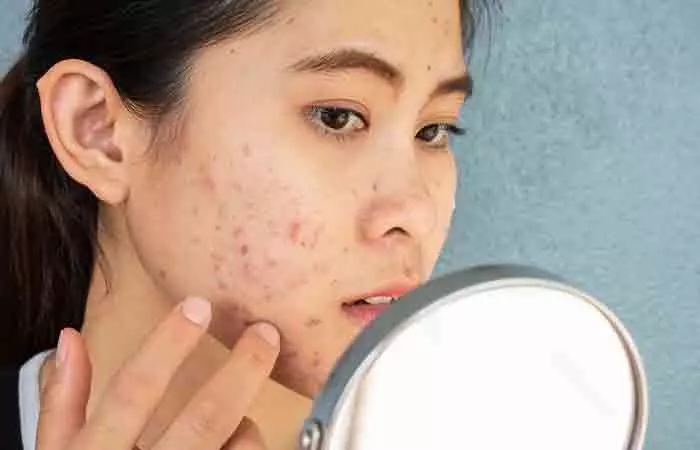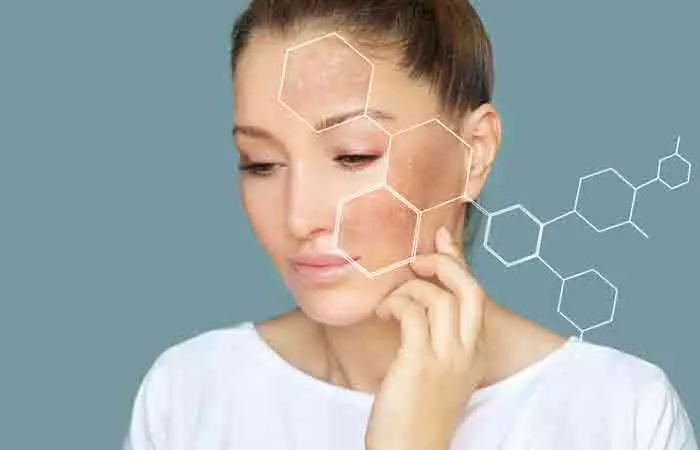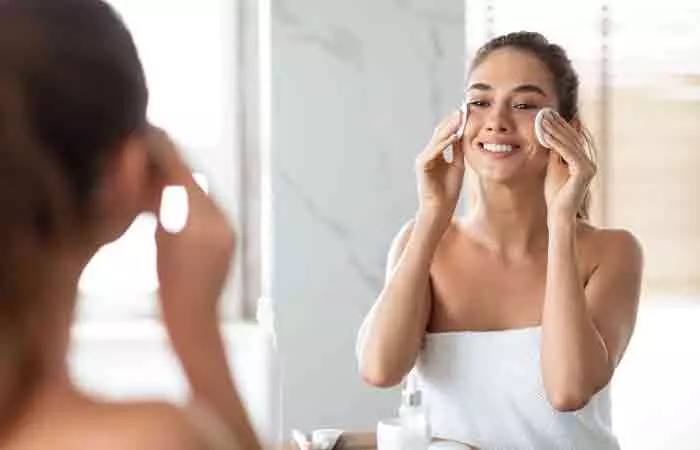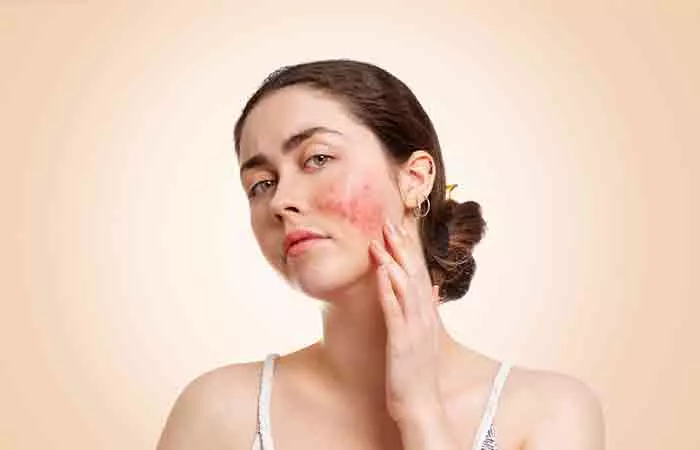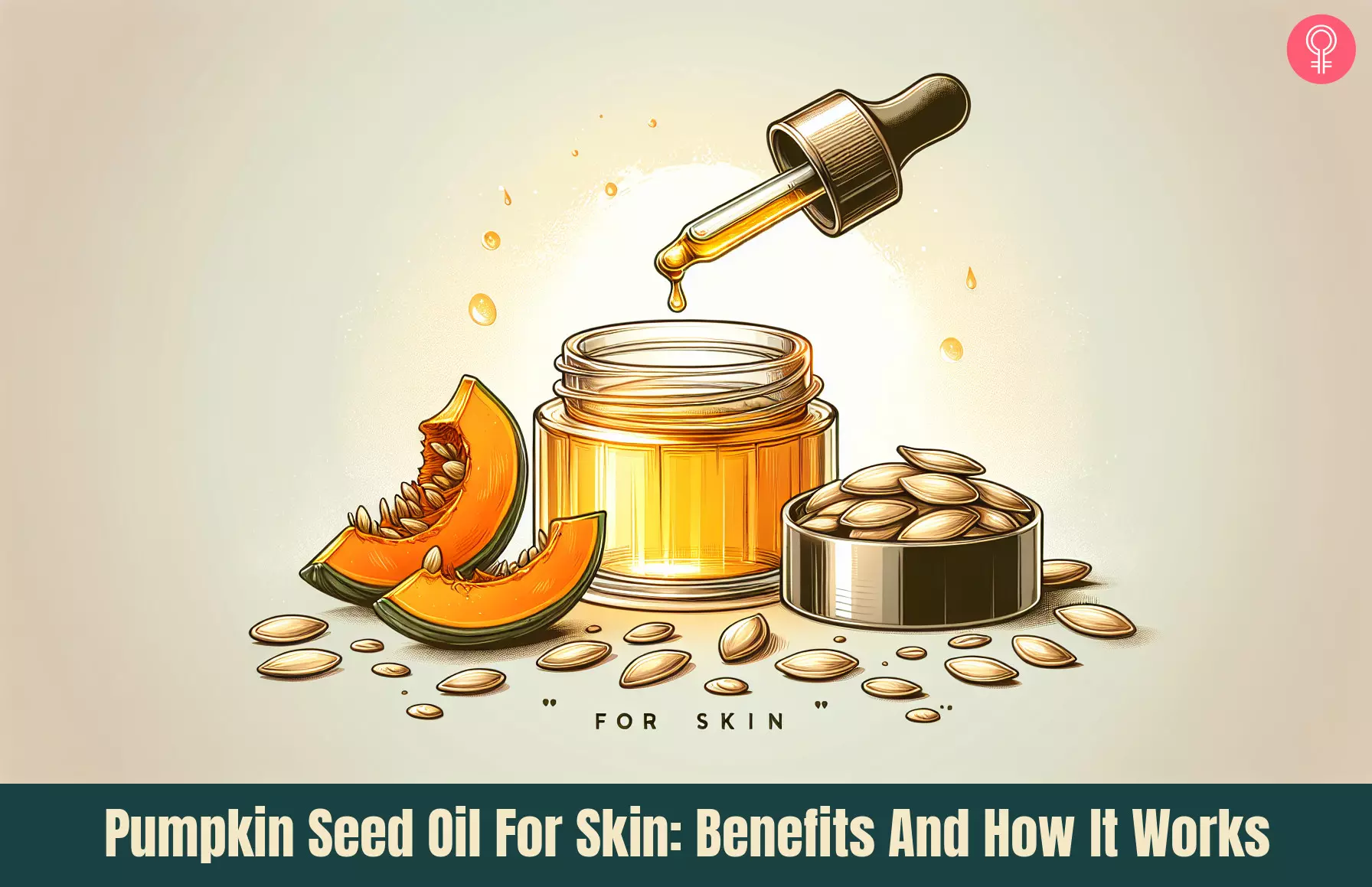Nutrition Facts Of Pumpkin Seed Oil
When talking about the extensive list of pumpkin benefits, we tend to forget that other parts of the vegetable and plant may also be nutrient-rich and have many benefits for our overall health. As a derivative of its seed, pumpkin seed oil also has a rich nutritional profile and contains the following nutrients: What Are Its Benefits? It helps with acne, inflammation, and skin infections like boils and cellulitis, and reduces signs of aging. Who Can Use It? Anyone except infants, and pregnant or lactating women. How Often? Few teaspoons in moderation for topical application. Caution Avoid using it if it causes allergic reactions like redness, swelling, or inflammation.
Essential fatty acids like linoleic and oleic acids (1), (2) Antioxidants like vitamins A and E (3), (4) Minerals like zinc, phosphorus, magnesium, selenium, and potassium (1), (5) Unsaturated and saturated fats (6) Bioactive compounds like beta carotenes, alpha-tocopherol, lutein, and phytosterols (6)
When consumed, these nutrients may help reduce inflammation and the risk of cardiovascular issues (6). However, applying pumpkin seed oil on your skin may also help with moisture retention, reduce free radical damage, and keep your skin soft and healthy. Check out the next section for some insights into the benefits of using pumpkin seed oil.
Benefits Of Pumpkin Seed Oil For The Skin
It’s an incredible plant-based ingredient for our skin, particularly our face, as it’s high in:Vitamin A – keeps skin firm and healthy. Beta Carotene – a precursor of vitamin A that helps maintain healthy skin. Vitamins B2 & B3 – They soften the skin and improve complexion. Potassium – It helps regulate the amount of water in cells (along with sodium). Magnesium – This is an essential mineral for skin health. Zinc – It helps with the formation of new skin cells and collagen production.
1. Helps Manage Acne And Other Skin Inflammation
Pumpkin seed oil contains beta-carotene and unsaturated fatty acids, which have anti-inflammatory properties. It is effective against acne-causing bacteria like P. acnes and S. aureus. When taken orally or applied topically, pumpkin seed oil can reduce acne inflammation and soothe other acute and chronic skin inflammatory conditions (5), (7).
2. Prevents Skin Infection
Pumpkin seed oil has antimicrobial and antifungal properties and is active against fungi like Candida albicans and bacteria like Staphylococcus aureus (5). Candida albicans causes candidiasis, an itchy skin rash, and S. aureus causes impetigo (a red, itchy sore) and other skin infections like boils and cellulitisi Skin infection caused by bacteria which leads to pain, swelling, tenderness, and redness in the affected area. (other than acne). Moreover, pumpkin seed oil contains phloem exudate (liquid secreted by the tissue), which adds to its antifungal activity (5).
3. Promotes Wound Healing
A study conducted on rats showed that cold-pressed pumpkin seed oil could promote wound healing. Cold-pressed pumpkin seed oil contains tocopherols, sterolsi Organic compounds present in animal and plant lipids or fats that help treat irritated skin and improve skin elasticity. , and polyunsaturated fatty acids. These compounds make it an excellent antioxidant and antimicrobial agent to promote wound healing (8).
4. Minimizes Aging Signs
The saturated fatty acids and antioxidants like vitamins A, C, and E in pumpkin seed oil prevent free radical damage and minimize signs of aging. It contains minerals like magnesium, potassium, zinc, and other nourishing ingredients that give healthy skin from within, minimize the appearance of wrinkles, improve skin texture, elasticity, and integrity, and prevent conditions like dermatitisi An inflammation of the skin that can cause rashes, dryness, itchiness, or small blisters on the skin. (5),(7), (9), (10). Additionally, it contains vitamins B2 and B3 which keeps the skin soft and improves its complexion.
5. UV Protection
A study shows that pumpkin extract has protective effects against UVB-induced skin damage. It works as a photoprotective agent and minimizes UV-induced collagen damage (11). Several studies confirmed that pumpkin seed oil in herbal and cosmetic formulations could provide superior photoprotection. Its antioxidant properties can reduce the risk of UV-induced skin cancer, photoagingi Skin damage caused by prolonged exposure to UV radiation. It results in the breakdown of collagen and leads to premature aging. , and skin redness (12), (13).
6. Reduces Hyperpigmentation
Red pumpkin seed extract can also prevent UV-induced hyperpigmentation. It blocks the reactive oxygen species that trigger the Nrf2 signal (a pathway that mediates inflammatory factors), thus minimizing the risk of developing pigmentation (14).
7. Makeup Removal
Pumpkin seed oil can be used as a natural oil cleanser to remove makeup. It thoroughly cleanses the skin without irritating it (15). You can consume pumpkin seed oil or use it topically to leverage its benefits. Here are a few ways to add pumpkin seed oil to your skin care regimen.
How To Use Pumpkin Seed Oil
You can use pumpkin seed oil as a moisturizer and apply it directly to your skin. You can also mix it with your favorite skin products and creams. Use skin care products that contain pumpkin seed oil. Add pumpkin seed oil to DIY face masks or use it as a carrier oil. Consult a nutritionist or dietitian and add pumpkin seed oil to your diet.
Lisalise, a blogger, shares her love for pumpkin seed oil for its skin-loving qualities, except she can’t get rid of its unpleasant smell. In one of her blog posts, she writes, “I love what this oil contains and offers for skin care – and would really like to make it work – but no matter what I mix it with, it can’t pass the ‘nose test’ (i).”
Side Effects Of Pumpkin Seed Oil
While there are many pumpkin seeds benefits for your health in numerous ways, it may cause allergic reactions like:
Swelling Redness Inflammation.
Consult a dermatologist if you experience any of the symptoms.
The Takeaway
Does pumpkin seed oil tighten skin? Yes, pumpkin seed oil contains vitamin A, which tightens the skin by improving its texture and elasticity. But more research is needed to prove this claim. Will pumpkin seed oil clog pores? Pumpkin seed oil may clog your pores if you have oily or combination skin as it has a low comedogenic rating. However, it is recommended for acne, which is common in oily skin, as it has anti-inflammatory properties. Does pumpkin seed oil help with cellulite? Pumpkin seed oil may help reduce cellulite. Pumpkin flesh contains flavonoids, which may have anti-cellulite properties. Is pumpkin seed oil good for your lips? Yes, pumpkin seed oil is good for the skin on your lips. It keeps your skin moisturized and can reduce dryness or chapped lips.
Illustration: Pumpkin Seed Oil For Skin: Benefits And How It Works
Make your own pumpkin seed oil for healthy and beautiful hair and skin! To achieve the best results, watch this simple step-by-step video tutorial for more information.
